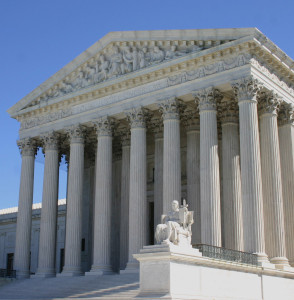On April 1, 2016, the Texas Supreme Court, in Houston Belt & Terminal Railroad Co., et al.. v. City of Houston, et al., reviewed the implementation of the City of Houston’s 2011 drainage fee ordinance. The petitioner railroad companies were assessed substantial new annual city drainage fees of $3 million by the City’s Director of Public Works. The Director determined that all of the railroads’ properties within the City of Houston “benefitted” – a term in the city ordinance—from the City’s drainage system, and that 93 million square feet of railroad property was “impervious,” allowing storm water to runoff into the drainage system which collected and otherwise managed this runoff. The Director made his determination of assessable property on the basis of aerial images and not digital map data, as required by the ordinance. For this reason, the railroads protested this new assessment and filed a lawsuit to challenge it. The City moved to dismiss the lawsuit on the basis of governmental immunity, but the Texas Supreme Court noted that the defense “does not bar a suit against a government officer for acting outside his authority—i.e., an ultra vires suit,” citing Tex. Parks & Wildlife Dep’t v. Sawyer Trust, 354 S.W.3d 384, 393 (Tex. 2011). It recognized that “[t]o fall within this ultra vires exception,” however, “a suit must not complain of a government officer’s exercise of discretion, but rather must allege, and ultimately prove, that the officer acted without legal authority or failed to perform a purely ministerial act,” citing City of El Paso v. Heinrich, 284 S.W.3d 366, 372 (Tex. 2009) and Fed. Sign v. Tex. S. Univ., 951 S.W.2d 401, 404 (Tex. 1997). Reviewing its case law and the pleadings, the Court held that the railroads’ pleadings were sufficient to confer the trial court with jurisdiction over their claims that the Director acted in an ultra vires capacity when he determined the extent of the impervious surface area of their properties.
2015 San Francisco Gross Receipt Tax FAQs
In San Francisco Gross Receipts Tax – Frequently Asked Questions from the Real Estate Industry,  Pillsbury attorney Rachel Horsch discusses frequently asked questions posed by commercial real estate investors and operators regarding how the San Francisco Gross Receipts Tax (GRT) may apply to typical commercial real estate investments and transactions.
Pillsbury attorney Rachel Horsch discusses frequently asked questions posed by commercial real estate investors and operators regarding how the San Francisco Gross Receipts Tax (GRT) may apply to typical commercial real estate investments and transactions.
Photo: GotCredit, Taxes, Taken on April 14, 2015 – Creative Commons
Texas Supreme Court: Improper Application of Project-Influence Rule Resulted in Harmful Error
The Texas Constitution provides that “[n]o person’s property shall be taken, damaged or destroyed for or applied to public use without adequate compensation being made.” Tex. Const. art. I, § 17. The Texas Supreme Court has effectuated this constitutional imperative by requiring payment of the “market value” of condemned property, which it has determined is “the price which the property would bring when it is offered for sale by one who desires, but is not obligated to sell, and is bought by one who is under no necessity of buying.” The court has recognized that an impending condemnation project can distort the value of property. The nflationary effects referred to as “project enhancement” in contrast to deflationary effects which are referred to as “condemnation blight” or “project diminishment.” Since neither reflects true “market value” of the property—”what a willing buyer would pay a willing seller under market conditions”—the project-influence rule evolved to ensure that such components are removed from a market-value determination. The project-influence rule is intended to ensure that the property owner is made whole—”not placed in either a better or worse position than he or she would have enjoyed had there been no condemnation.” Recently, the Texas Supreme Court was called upon to consider whether the State’s role in delaying the cleanup of contaminated property should be a factor considered when determining the market value of condemned property. Continue Reading ›
Time—the Resulting Deductible of a Default?
 In his November op-ed, C. Andrew Gibson states that bonds do not have a deductible as compared to a subcontractor default insurance (SDI) policy that does carry a deductible. The statement is literally correct. A bond does not have a “written” deductible when a default takes place. However, frustration develops when the question is asked “When will a bond pay?” We will explore the time it takes for each to respond and pose the question at the time of default, would you rather have contract certainty (SDI) or uncertainty (Bond)? Is uncertainty a deductible disguised as loss of time?
In his November op-ed, C. Andrew Gibson states that bonds do not have a deductible as compared to a subcontractor default insurance (SDI) policy that does carry a deductible. The statement is literally correct. A bond does not have a “written” deductible when a default takes place. However, frustration develops when the question is asked “When will a bond pay?” We will explore the time it takes for each to respond and pose the question at the time of default, would you rather have contract certainty (SDI) or uncertainty (Bond)? Is uncertainty a deductible disguised as loss of time?
New Law, New Opportunity: A closer look at Peru’s revised P3 framework
Historically, investors have pretty clearly found the Peruvian legal framework for procuring, awarding and  monitoring concessions to be a favorable one — just since 1996, the country has awarded more than US$20bn in Public-Private Partnership concessions. But a new legislative structure for PPP financings in Peru entered into force at the end of 2015, replacing the prior legal regime and introducing some significant changes. While some commentators have reacted negatively to the new framework, it is my view that the new law is modern, progressive, and provides a mature and comprehensive framework that should continue to attract private investment in Peru’s infrastructure. In an article for Project Finance International, New Peruvian Framework for PPPS, I examine the recently implemented legislation in depth, and arrive at the conclusion that it may prove to be a very useful model for other countries in the region and around the globe. I’m looking at you, Argentina…
monitoring concessions to be a favorable one — just since 1996, the country has awarded more than US$20bn in Public-Private Partnership concessions. But a new legislative structure for PPP financings in Peru entered into force at the end of 2015, replacing the prior legal regime and introducing some significant changes. While some commentators have reacted negatively to the new framework, it is my view that the new law is modern, progressive, and provides a mature and comprehensive framework that should continue to attract private investment in Peru’s infrastructure. In an article for Project Finance International, New Peruvian Framework for PPPS, I examine the recently implemented legislation in depth, and arrive at the conclusion that it may prove to be a very useful model for other countries in the region and around the globe. I’m looking at you, Argentina…
Photo: Jorge Gobbi, Estación Villa El Salvador, Taken Feb. 2, 2012 – Creative Commons
4th Circuit Revisits N.C.’s Statute of Repose; No Bar to Hazardous Waste-Related Personal Injury Claims
Twice, courts have been called upon to interpret North Carolina’s 10-year statute of repose in connection with injuries allegedly stemming from the release of hazardous substances. CTS Corporation v. Waldburger involved CTS’s liability under CERCLA as the past owner of a manufacturing facility in North Carolina whose operations resulted in the release of hazardous substances which allegedly caused damage to Waldburger’s land. Stahle v. CTS Corporation involved CTS’s liability stemming from the discharge of toxic solvents into a nearby stream to which allegedly Stahle was exposed. CTS prevailed with its argument that the statute of repose barred claims against it in Waldburger (property damage) but it was not so fortunate in Stahle (personal injury).
8th Circuit Finds It Has Jurisdiction to Review EPA’s Approval of Minnesota Regional Haze Program
In mid-March, the U.S. Court of Appeals for the Eighth Circuit, in National Parks Conservation Assoc., et al., v. McCarthy, approved the “Minnesota’s Regional Haze State Implementation  Plan” (MRHSIP), rejecting the arguments opposing EPA’s approval filed by several environmental organizations. The conservation organizations challenged EPA’s approval of Minnesota’s decision to use the Transport Rule—also known as the Cross-State Air Pollution Rule (CSAPR)—in place of source-specific best available retrofit technology (BART), and Minnesota’s reasonable-progress goals. They unsuccessfully claimed that “the Transport Rule allowances in the Plan are not ‘better than BART.'” Of note in this opinion is that, reviewing 42 U.S.C. § 7607(b), two of the three judges on the panel concluded that the Eighth Circuit has jurisdiction because the state implementation plans’ (SIP) reliance on the Transport Rule was based on local issues. If it was nationwide in scope and effect, this case would have to be heard by the DC Circuit Court of Appeals. With that, the Court of Appeals held that EPA’s approval of the Minnesota Plan based on the Transport Rule was not arbitrary and capricious and, similarly, EPA’s approval of the plan’s “reasonable-progress” goals was proper. The Court of Appeals noted, however, that other circuit courts have issued rulings that appear to conflict with its disposition.
Plan” (MRHSIP), rejecting the arguments opposing EPA’s approval filed by several environmental organizations. The conservation organizations challenged EPA’s approval of Minnesota’s decision to use the Transport Rule—also known as the Cross-State Air Pollution Rule (CSAPR)—in place of source-specific best available retrofit technology (BART), and Minnesota’s reasonable-progress goals. They unsuccessfully claimed that “the Transport Rule allowances in the Plan are not ‘better than BART.'” Of note in this opinion is that, reviewing 42 U.S.C. § 7607(b), two of the three judges on the panel concluded that the Eighth Circuit has jurisdiction because the state implementation plans’ (SIP) reliance on the Transport Rule was based on local issues. If it was nationwide in scope and effect, this case would have to be heard by the DC Circuit Court of Appeals. With that, the Court of Appeals held that EPA’s approval of the Minnesota Plan based on the Transport Rule was not arbitrary and capricious and, similarly, EPA’s approval of the plan’s “reasonable-progress” goals was proper. The Court of Appeals noted, however, that other circuit courts have issued rulings that appear to conflict with its disposition.
SCOTUS Rejects Interpretation of Law that Posed Serious Criminal Consequences
Earlier this week the U.S. Supreme Court, in Sturgeon v. Frost, Alaska Regional Director of the National Park Service, issued a unanimous ruling reversing the U.S. Court of Appeals for the Ninth Circuit’s interpretation of the Alaska National Interest Lands Conservations Act (ANILCA) that  had the effect of subjecting the use of hovercrafts on the Nation River in Alaska to criminal enforcement. The parties disputed whether Section 103(c) of ANILCA created an Alaska-specific exception to the National Park Service’s general authority over boating and related activities in federally managed preservation areas, each reaching different conclusions about the scope of the National Park Service’s powers. The Court rejected the interpretation adopted by the Ninth Circuit, noting that “[u]nder the reading of the statute adopted below, the Park Service may apply nationally applicable regulations to ‘non-public’ lands within the boundaries of conservation system units in Alaska, but it may not apply Alaska-specific regulations to those lands.” This is the second recent decision by the Court reversing a lower court’s ruling involving environmental regulations that could have had serious criminal consequences. The earlier ruling was Yates v. United States.
had the effect of subjecting the use of hovercrafts on the Nation River in Alaska to criminal enforcement. The parties disputed whether Section 103(c) of ANILCA created an Alaska-specific exception to the National Park Service’s general authority over boating and related activities in federally managed preservation areas, each reaching different conclusions about the scope of the National Park Service’s powers. The Court rejected the interpretation adopted by the Ninth Circuit, noting that “[u]nder the reading of the statute adopted below, the Park Service may apply nationally applicable regulations to ‘non-public’ lands within the boundaries of conservation system units in Alaska, but it may not apply Alaska-specific regulations to those lands.” This is the second recent decision by the Court reversing a lower court’s ruling involving environmental regulations that could have had serious criminal consequences. The earlier ruling was Yates v. United States.
10th Cir.: Time-Barred Claims Not Revived by Repeated and Continuing Violations Theories
In early March, the U.S. Court of Appeals for the Tenth Circuit, in Sierra Club v. Oklahoma Gas and Electric Company, in a 2-to-1 decision, affirmed the district court’s dismissal of Sierra Club’s  Clean Air Act (CAA) citizens suit against OG&E, concluding that their civil penalty and equitable relief claims are time-barred because Sierra Club’s claims first accrued when OG&E commenced modifications to the at-issue boiler without the required permit in March of 2008. Both parties agreed that civil penalties originating before April 1, 2008 were time-barred. The Court of Appeals rejected Sierra Club’s arguments to extend the limitations period to after April 1 premised on there being repeated and continuing violations because of the lack of the required permit. Sierra Club’s claims for declaratory and injunctive relief were also time-barred because they were based on the same facts and timeline. What difference a few days make!
Clean Air Act (CAA) citizens suit against OG&E, concluding that their civil penalty and equitable relief claims are time-barred because Sierra Club’s claims first accrued when OG&E commenced modifications to the at-issue boiler without the required permit in March of 2008. Both parties agreed that civil penalties originating before April 1, 2008 were time-barred. The Court of Appeals rejected Sierra Club’s arguments to extend the limitations period to after April 1 premised on there being repeated and continuing violations because of the lack of the required permit. Sierra Club’s claims for declaratory and injunctive relief were also time-barred because they were based on the same facts and timeline. What difference a few days make!
SCOTUS Expected To Resolve Circuit Split on Implied Certification Under FCA
In Supreme Court to Hear False Claims Act “Implied Certification” Appeal, we provide a primer for the oral argument that will be heard by the U.S. Supreme Court on April 19, 2016 in Universal Health Services  v. United States ex rel. Escobar, No. 15-7. The Court is expected to resolve the current split among federal appellate courts on the so-called “implied certification” theory of liability under the federal False Claims Act (FCA). The FCA imposes significant financial penalties for “knowingly present[ing], or caus[ing] to be presented, a false or fraudulent claim for payment or approval,” and prohibits contractors from making false statements “material to a false or fraudulent claim.” As many government contractors are well aware, the FCA has long been the Government’s favorite enforcement tool against federal contractors. Stay tuned for updates!
v. United States ex rel. Escobar, No. 15-7. The Court is expected to resolve the current split among federal appellate courts on the so-called “implied certification” theory of liability under the federal False Claims Act (FCA). The FCA imposes significant financial penalties for “knowingly present[ing], or caus[ing] to be presented, a false or fraudulent claim for payment or approval,” and prohibits contractors from making false statements “material to a false or fraudulent claim.” As many government contractors are well aware, the FCA has long been the Government’s favorite enforcement tool against federal contractors. Stay tuned for updates!
Additional Source: Schumer Alleges False “Made in America” Representations on GSA Website: False Claims Act Inquiry to Follow?
Photo: David, US Supreme Court, Taken Sept. 19, 2014 – Creative Commons




